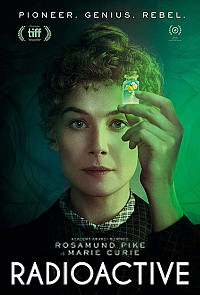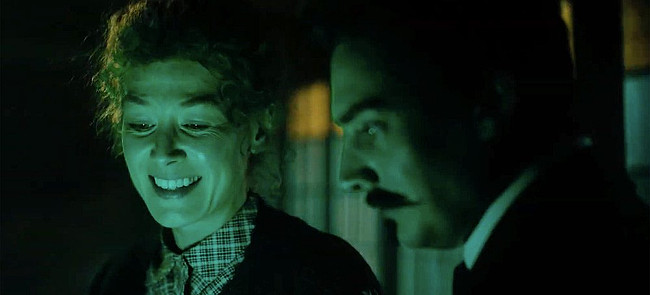| SHADOWS ON THE WALL | REVIEWS | NEWS | FESTIVAL | AWARDS | Q&A | ABOUT | TALKBACK | |||||
|
Radioactive
Review by Rich Cline |
| |||||
 dir Marjane Satrapi scr Jack Thorne prd Tim Bevan, Eric Fellner, Paul Webster with Rosamund Pike, Sam Riley, Aneurin Barnard, Anya Taylor-Joy, Simon Russell Beale, Drew Jacoby, Jonathan Aris, Tim Woodward, Harriet Turnbull, Cara Bossom, Ariella Glaser, Isabella Miles release UK 20.Mar.20, US 24.Apr.20 19/UK StudioCanal 1h49 


TORONTO FILM FEST |
 Director Marjana Satrapi and writer Jack Thorne take an ambitious approach in this biopic about Marie Curie. But the various threads stubbornly refuse to coalesce into something that's involving beneath the surface. Many of the flashbacks and flash-forwards become more distracting than helpful. And the episodic narrative begins to turn the characters into icons rather than people, despite fine performances from the cast. Born in Poland, Marie (Pike) must overcome sexism and xenophobia as a scientist in Paris. In 1893 Pierre Curie (Riley) invites her to join his lab and eventually marries her. Together with Paul Langevin (Barnard) they discover new elements radium and polonium, and Marie coins the word "radioactivity". She also becomes the first woman to win the Nobel Prize, and the first person to win two of them. But after Pierre's death, her life is engulfed in scandal. Still, she and daughter Irene (Taylor-Joy) set out to provide mobile x-rays for soldiers fighting in WWI. Curie's life is extraordinary, achieving so much through sheer determination, and Satrapi depicts this aspect of the story with real grit. Less successful, albeit gorgeously filmed, are scenes of her childhood trauma. And then there are the flickers showing much-later results of her work, from cancer therapy to Hiroshima and Chernobyl. These future sequences are oddly over-produced, complete with specific characters who never have a chance to connect with the audience. They would have worked better as a quick climactic montage. Pike dives into the role, playing Curie over the course of 40 years as a feisty, funny woman full of personality, passion for her work and an earthy love for Pierre. Her scenes with Riley (who channels John Hurt) have an understated but enjoyable chemistry, as it were, as do the oddly less-fizzy scenes with the superb Barnard. In the later scenes, Taylor-Joy has terrific presence as Curie's equally forceful daughter. Indeed, Irene went on to win her own Nobel. The script does a terrific job at pinpointing the bigger issues gurgling in Curie's story. In addition to utterly changing the scientific world, the film notably depicts the way she challenged the patriarchy that repeatedly dismissed her, while fiercely living her life on her own terms. These powerful, inspiring elements make her story vitally important, even if Satrapi kind of takes the wind out of the film's sails by straining a bit too far toward cinematic invention. Curie's scientific achievements, presented with clarity and urgency, are much more compelling.
R E A D E R R E V I E W S 
 Still waiting for your comments ... don't be shy.
Still waiting for your comments ... don't be shy.
|
||||
© 2020 by Rich Cline, Shadows on the Wall | |||||
| HOME | REVIEWS | NEWS | FESTIVAL | AWARDS | Q&A | ABOUT | TALKBACK | |||||

